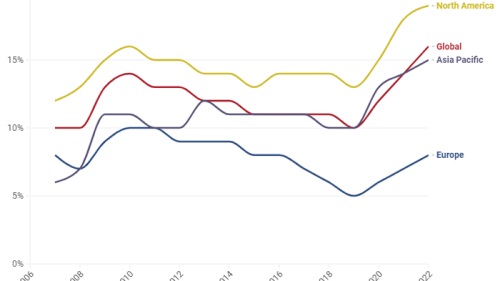The supremacy clause of the U.S. Constitution provides that the Constitution, federal laws, and treaties are the “supreme law of the land.” Federal and state governments are therefore bound to follow federal laws over any conflicting state laws or statutes. While the supremacy clause has been followed for nearly 200 years, the limits of the law have recently been tested in the most unlikely of arenas: marijuana legislation and regulation. Unfortunately, this has caught commercial and multifamily property owners and managers in the crossfire between state regulations and federal laws.
At the crux of the issue is the fact that “modern legalizations of marijuana were not anticipated when the federal law was written, so it was not written in a way to accommodate them,” explains Isaac Campos, a history professor at the University of Cincinnati in Ohio and author of Home Grown: Marijuana and the Origins of Mexico’s War on Drugs (University of North Carolina Press, 2014). “It’s complicated. I’ve talked to policy reformers who have long been saying that the problem with the legalization of marijuana is that it is a Gordian knot. It’s just so complex; there are so many regulations and restrictions at all these different levels of government that no one is quite sure how it is going to be sorted out.”
The federal Controlled Substances Act provides that marijuana is a schedule I drug, which is illegal to cultivate, distribute, or possess. This classification by the U.S. Drug Enforcement Agency recognizes no medical use and carries the toughest drug penalties. The federal law does not provide for any exception for the medical use of marijuana. According to the terms of the supremacy clause, states must not and cannot enact laws that conflict with the federal law. However, states have been doing exactly that, resulting in a legal limbo in which a person can be engaging in conduct that is legal under state law but illegal under federal law.
Medical marijuana is now legal in the District of Columbia and 23 states. Eleven other states have passed legislation paving the way for certain medical patients to legally use cannabis extracts. Marijuana has also been legalized by Alaska, Colorado, Oregon, and Washington for recreational use. Legalization was approved by voters in the District of Columbia in 2014, but its implementation was apparently overruled by Congress as part of its spending bill, which prohibits the use of any state or federal funds to enact the legalization of marijuana in the District of Columbia. The effects of this remain unclear since the bill prohibits enactment, not implementation; and since the bill was previously enacted, it remains an open question as to whether Congress actually overturned the bill.
While the current federal government has adopted a policy that is incongruous with its own laws—namely, a hands-off approach to the states that have adopted laws recognizing some form of acceptable marijuana use—that does not change the nature of the criminality under federal law. One cannot be assured that the federal government is going to always maintain such a hands-off policy and thus one must tread carefully in making decisions that adopt a favorable marijuana use policy, absent a change in the federal law.
This conflict between state and federal law greatly complicates the decision-making process facing property owners and managers. When one adds in the requirements set by other state statutes such as privacy rights, medical rights, or disability laws, situations become potential landmines for a multifamily property owner. Concerns can encompass lending requirements and disclosures, subsidized housing policies, privacy rights, landlord/tenant disputes, and habitability standards.
Lending Issues
Accepting a loan in the form of borrowed funds, including one that involves a federal component or federal backing, mandates numerous disclosures and agreements. If you are a property owner acquiring that loan, you must now understand what loan requirements you are agreeing to contractually guarantee as part of the loan process. For example, signing that you agree that your property will comply at all times with both state and federal law opens the potential that a resident might use medical marijuana on the property. This promise to comply with the law compromises your ability or rights to prevent such use, and exposes you to risks ranging from a claim that you have breached the loan documents, to foreclosure, or to an allegation of civil or criminal fraud in the loan process.
Each party signing loan documents needs to ensure that he or she understands the full scope of what he or she is agreeing to as part of a loan, especially if it is federally underwritten. Similarly complex issues arise in the case of housing that is state and/or federally subsidized. For the property owner or manager who accepts subsidies of any kind, ensuring compliance with the applicable state or federal law should be a preeminent concern. In some jurisdictions, providing for low-income housing is a prerequisite to obtaining a building permit or a certificate of occupancy.
While such a situation has yet to arise, it is reasonable to think about what could happen if a property’s entitlement to provide for subsidized housing were pulled due to knowledge that criminal violations of federal law were occurring on the property. Could a local building department pull a certificate of occupancy because the building was no longer in compliance with federal law? While marijuana use might be acceptable under state law, the property owner or manager must always be cognizant of following the applicable regulations. Again, the real estate practitioner must consider the potential for being accused of fraud in the context of obtaining the right to provide subsidized housing.
On top of the risks in the lending and subsidy arenas, one must also consider the risk of criminal and civil penalties that exist for owners, managers, and their agents in these situations. Could a federal agent arrest a property manager for knowingly allowing medical marijuana use in an apartment unit? If the owner established a policy that allowed for observation of state rights—despite the federal conflict—could the principals be arrested? The answer appears to be yes, albeit unlikely. Property owners who allow marijuana on their premises also risk losing their buildings to the federal government through civil forfeiture cases. “The federal government isn’t actively doing that, but it remains a remote possibility,” says Sam Kamin, a law professor and director of the Constitutional Rights and Remedies Program at the University of Denver’s Sturm College of Law in Colorado.
So given the risks, can a multifamily owner or operator adopt a bright-line rule against marijuana use on its properties? It is certainly advisable to have a clear and unambiguous policy regarding marijuana smoking on properties where its use might be allowed under state law. However, what that policy actually should be depends on multiple and unclear factors.
One might argue that “the safest course is to prohibit all marijuana,” says Kamin. “Amendment 64 explicitly gave property owners [in Colorado] the right to exclude marijuana from their premises. Landlords can put in the lease that a tenant [must] not possess marijuana, not grow marijuana, and not smoke marijuana, and that would be permissible.”
Does that mean that a landlord can ask a prospective tenant if he or she smokes marijuana, or does it mean only that the landlord can outlaw marijuana as part of a lease agreement? Where is the line between restricting rights and invading privacy rights? Under most states’ laws and the federal Constitution, individuals have a right of privacy that cannot be invaded—except that limitation does not typically extend to criminal activity. So can one ask about marijuana use that is permitted under state law, but which is not permitted under federal law? If so, what jurisdiction might have a cause of action against you for violating rights of privacy?
The issue becomes even more difficult to resolve in states that allow the medical use of marijuana. In all states, for instance, consumers are protected by the Health Insurance Portability and Accountability Act of 1996 (HIPAA), which provides that it is both a crime and a civil rights violation to invade someone’s medical privacy for certain businesses. Thus, if one were to broadly exclude marijuana use on a property, in a state where medical marijuana is allowed, that owner or manager might be restricting the tenants’ rights to their medicine and forcing the disclosure of their private health information. Directly related, if you exclude a cancer patient who relies on the use of marijuana, in any form, as a prescription medicine, are you violating any discrimination laws such as Unruh (a California statute that outlaws discrimination for medical disability, among other things), the federal fair housing law, or any other state laws on discrimination?
Thus, it is essential that multifamily landlords have a clear understanding of the laws regarding marijuana in the states where they own property, as regulations can drastically differ. For instance, the Michigan State Senate passed Senate Bill 783 in March 2014, which specifies that private property owners are not required to “lease residential property to any person who smokes or cultivates marijuana on the premises, if the prohibition against smoking or cultivating marijuana is in the written lease.” (The bill was still pending in the Michigan House Committee on Judiciary as of late 2014.) In contrast, Rhode Island’s Medical Marijuana Act states that “no school, employer, or landlord may refuse to enroll, employ, or lease to or otherwise penalize a person solely for his or her status as a cardholder.”
Landlords must be particularly cautious in how their policies regarding marijuana are worded, as exemplified by a situation in which a Washington State landlord asked all tenants to sign a lease addendum in 2013 stating that any use or possession of marijuana would be grounds for eviction. As it turns out, one of the building’s residents was using a liquid form of medical marijuana that had been prescribed to him. Distraught by the new policy, this tenant reached out to the media with his story, which prompted an attorney to offer him pro-bono legal representation. In response to the press coverage, the building’s management company issued a statement saying that they were unaware of this tenant’s need for a medical marijuana tincture and had only been trying to create a smoke-free environment.
Alex Kreit, a law professor at the Thomas Jefferson School of Law in San Diego and author of Controlled Substances: Crime, Regulation, and Policy (Carolina Academic Press, 2013), says, “I think it is a state-by-state question of whether there are any potential discrimination-type protections that might apply to medical marijuana patients.” Continuing, he explains, “In a state with explicit protection, there is the further question of, ‘Do you have to accommodate everything this patient wants to do, or would it be enough to say they have to consume the medicine in the form of an edible product?’ And if so, are you discriminating by treating consumers differently in allowing exceptions to the lease limitations and compounding your potential liability?”
The unambiguous certainty that may result from drawing a bright line by choosing to exclude marijuana users on your property may be the exact opposite—namely, that you open yourself up to other claims premised on discrimination.
Livability Issues
While correlations can be drawn between marijuana and cigarette smoke, the marijuana issue becomes more complex and layered than cigarette use, especially considering the added component of medical use of marijuana.
A prohibition on cigarette smoking in multifamily properties has become increasingly commonplace. Aimco, national owner and operator of apartment properties, has even begun including a smoke-free policy in leases that prohibits smoking within units, on balconies, and anywhere on the community grounds, including in vehicles.
The implementation of tobacco-free policies that are clearly defined and strictly enforced can protect management companies, co-op boards, and homeowners associations from lawsuits over secondhand smoke, as those without these regulations in place have found themselves the subject of legal action in recent years.
The distinction, however, is that no one agrees that cigarette smoking is healthy for the user and for those subjected to secondhand smoke. But proponents of marijuana for medical use tout the medical benefits of increased appetite and pain relief. Thus, a rule against marijuana use, similar to cigarettes, might not be the salve that the property owner or manager seeks.
What if one were to follow the state law, and allow medical use—or all uses? Assuming one can navigate around the potential civil, criminal, and other liabilities, the potential for landlord/tenant issues comes to the forefront.
Instances of disgruntled tenants turning to the press over their concerns about marijuana smoke have already begun to crop up in Colorado, which, through Amendment 64, which was passed in 2012, became the first state to legalize recreational marijuana use for adults age 21 and older. (Marijuana retails shops opened in Colorado for the first time in 2014.)
For landlords and building managers dealing with complaints from tenants regarding marijuana smoke, stepping in as quickly as possible to work out a solution may be the best course of action to avoid an escalation of the situation.
“My take is that it is probably not that dissimilar in many ways from any other kind of landlord/tenant dispute,” says Kreit. “At the end of the day, I imagine that to the extent it is at all possible, you’re probably better off trying to resolve the issue without it becoming some sort of a legal process.”
Again, one must take note of discrimination and state and federal fair housing laws. Do these laws require that you make reasonable accommodation for a tenant who wants to smoke marijuana on his or her balcony? What if the smoke drifts to another unit rented by tenants who have a child? What if the neighbor has a respiratory ailment, and the smoke is affecting his or her health? The solution may be to move one or both of the tenants to other units, or to ask the offending tenant to use his or her marijuana in an edible form. However, what occurs if neither of the tenants will relocate?
And what happens if the tenant asserts that smoking medical marijuana is the best method for his or her use, or refuses to change the behavior?
Can you evict one or both tenants? The answer may lie in the lease or in state laws—but it also may not. Landlords and property managers must be aware of whether they are creating a situation that could hold them liable for a nuisance claim from one or more tenants. Are you breaching the implied warranty of habitability? Are you breaching the lease, or rules and regulations that could be enforced against the landlord? Could you be sued on a class-action or mass-tort basis?
All of these factors must be considered. While the simplest resolution might be for the federal government to revise the schedule I regulation for marijuana, that appears unlikely. Until such a revision is made, however, owners and managers must choose their paths carefully.
(See a short list of Do’s and Don’ts below)
Morgan Stewart is a partner with Manly, Stewart & Finaldi, a law firm in Irvine, California, that specializes in real estate. He devotes his practice to advising national multifamily and commercial real estate clients on legal issues including construction litigation, insurance bad faith, general corporate formation issues, contract negotiation and development, and personal injury.
Do’s:
- Review your leases and other residential contracts to ensure that you are in compliance with both federal and state laws.- Conduct in-depth research on marijuana-related legislation and prior cases in your state to ensure that you are following proper protocol.- Implement clear policies regarding marijuana use on your properties.- Investigate how renting to legal marijuana users may affect your loan compliance obligations.- Recognize that you have potential fair housing obligations to tenants who may be affected by smoke.- Review any smoke-free policies to see what effect they have on medical marijuana users.- Consider asking tenants who smoke marijuana for medical purposes if they could use a different form of the drug such as edibles or tinctures, or use fans to alleviate secondhand smoke issues, provided that you are not in violation of any other state law.- Stay abreast of new developments regarding marijuana regulations in states and districts where you own property.
Don’ts:
- Don’t stall when it comes to resolving tenant disputes over secondhand marijuana smoke.- Don’t refuse to make reasonable accommodations for residents with disabilities who are being affected by marijuana smoke.- Don’t ask current or potential tenants about their medical marijuana status, as doing so may violate HIPAA laws and other privacy rights.- Don’t assume that medical marijuana users are a protected class under federal fair housing laws, since United States v. Southern Management Corp. established that substance users (i.e., marijuana smokers) are actually excluded from protection.- Don’t assume that medical marijuana users are not a protected class under state fair housing laws, such as California’s civil-rights act (Unruh)- Don’t fail to enforce any smoke-free policies you have implemented.
With marijuana regulations continuing to evolve in states around the country, landlords and others in the multifamily industry need to stay abreast of new developments so that they can make the most-informed decision possible if tenant disputes or fair housing implications arise. Although there are no easy answers, stepping in to handle the situation as soon as possible may be the best course of action for avoiding unwanted legal action. - MS





